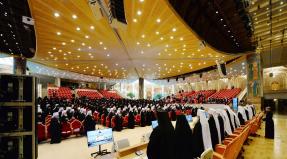Choir obedience. F
What a nuisance happened - it was badly received at the choir. They squint, whisper behind their backs, show their displeasure. Yes, and for a word may not go into your pocket. Yes, sometimes no words are needed. An eloquent pose can be as telling as a statue of Lenin's grandfather, sending somewhere in the heavens ... in the far, distant future. And we don't need that far, do we? We want to please everyone. Anyway, are we bad people? It's just that we probably made a mistake.
Oh, these mistakes. Life consists of them, interspersed with rare moments of success. So you want to be a prince on a white horse, or a wonderful princess, in front of which the aforementioned prince fell on one knee, holding out the coveted morocco box. It is known with what. But no. Life is in no hurry to bestow success, in no hurry to push the crown on its head. Preferring to play football with your head, as in famous song.
But since the head is not only what they eat, but sometimes it is also a very powerful tool for curving the space-time continuum and, in general, a powerful device for carrying strangers brains, let's try to use this machine for combing reality according to the TK, according to the instructions and behests of the party.
Simply put, let's try to solve one of our problems with the help of 1.5 kg of gray matter. Are we badly received at the choir? We will make it well received.
1. Badly received.
You just came and you are not well received? It means that you have made some mistake of joining the team. Let's talk about mistakes.The choir is often a female collective. Moreover, with orders very similar to the army. Not in the discipline part, but in the part where "respect and respect" is due to the old-timers, and the newcomer should feel out of place. As in the army game, "the salaga should be built." And you will be built the more aggressively, the more you come with a pretense of respectability.
If you only came, then - make at least an appearance, as you respect everyone around. Add a touch of admiration to your look. Nothing annoys old-timers like being independent, and too understanding view. A beginner's modesty always captivates. Modest in behavior, but not modest in efforts.
Efforts you must show, like a bomb-cracker, that rushes about on New Year's Eve in the snow, scattering crackling sparks and amusing children. "More more!" - children shout, contemplating a funny fiery toy.
"More, more" - the old kliroshans rejoice and demand bread and circuses, watching you desperately try to guess with the melody of the voice or to sing everything correctly. The excitement of others at such moments is pleasant. For it betrays your own status - imperturbable and experienced. After all, superiority even in this aspect is pleasant. And a too competent specialist, coming to the choir with an imperturbable air, will frighten many by the fact that he did not pass set stage - beginner and apprentice.
And nature does not like break-ins and hacks, as well as women's groups. So, even if you are seven spans in your forehead, remember the laws of the army barracks. At least portray diligence and fear. Otherwise, you will be disliked.
Historians and philosophers argue about whether a newly arrived specialist, if he is from another kliros and is not known in the current kliros, should immediately show his professional capabilities.
Someone says that if "you show too much talent, you will be considered a competitor and hated." Someone defends the point of view that no one wants to mess around with a too gray specialist. Indeed, it is important not to overdo it here, but it is also dangerous to "underdo".
Do I need to show all my capabilities at once?
I am personally a supporter of the idea that a newcomer should just sing quietly. Neatly, cleanly, everywhere to hit the notes and beats, but - quietly. How modest and neat. Regents generally dislike overconfident voices. And when the choir director asks to turn up the sound, then add more firewood to the furnace. In the meantime - modesty, modesty, modesty. I have not yet seen modesty coupled with neatness and punctuality ruin a relationship.
In general, people love very much when their opportunities grow, but in such a way that it is not particularly striking at the expense of whom they grew up.
This is generally the golden principle of a good and long life on the kliros - to be very useful, but quiet. For you to be like air - necessary, but invisible. If you can, you will live happily ever after, and you will be appreciated. I emphasize especially - just do it. Do not read this article and mentally agree, namely, try to follow my recommendations.
Be humble in demeanor but proactive in your work. At least try to be a little more humble. You will become more modest by 20%, relations will improve by all 50%. By "modest" is meant "talk less - do more."
I have been working on the choir for a long time and something did not work out.
It's easier with this. Usually it didn't work out for a simple reason. The mastered person becomes less complaisant, from him begins shove nature... And the more cocky and self-confident a person turns out to be at the exit of this cheerful conveyor, the sooner relationship problems begin.This problem is generally similar to family problems in the second year of life. The romance of the honeymoon has long evaporated, the betrothed in a year has already begun to get fed up, the masks are gradually drying out and falling off, revealing such faces of our souls.
The trouble is that we do not change so much as we play. Not so much good as pretending to be. And so we came to the kliros, and with a mighty effort of will drove our insides into the subconscious to ourselves ...
But how much can you pretend? A month, two? Sooner or later we will show who we are. Of course, I'm not ready to demonize us. It's just that the choir exposes our shortcomings very sharply. And these shortcomings are basically the same.
Disadvantage 1. Too active, I get into everything. This joke bomb went from jokes to action. And there are different phases - from acceptable to malignant. The bottom line is that a person can start very actively commenting on everyone. And if he is not the regent (and not everything will be forgiven to the regent), then sooner or later everyone will get tired of it, because the conclusion that this person considers himself more experienced than others just lies on the surface.
And it annoys everyone. For this is the same as going into a gateway at night and saying, "Well, who is hiding here, go out to battle, now I’ll go to everyone, I’ll show everyone." Of course, what will happen next is not so difficult to imagine.
It is not a secret what will happen to this person on the choir. He will be considered deceived. The priests will start to shy away. Among the kliros of the city, information will be disseminated that such and such a choir is in delight. Batiushek teaches, teaches singers, makes comments to everyone.
Of course, this is not a beauty in most cases. Just like in a family, some crooked slippers or the use of someone else's toothbrush is fiercely annoying. And poor quality singing, bad order, lack of discipline - will be annoying. But - all questions of such a plan must be resolved through confession. As a last resort, simply volunteer as a regent, saying "I can improve everything." And then - please, fix whatever you want. True, in this case, they will say "ate (a), sat down (a), bad person, radish. "And it will be true.
Therefore, we go back to where we started. The choir, the temple, the monastery are all alike in that obedience is paramount on it. Obedience is not good because you listen to good and bad advice with the same joy and put up with the wrong order. Obedience is good because it gets rid of the illusion "I am the most active ... only I need this ... everything depends only on me ... without me it will all fall apart." Often, the novice is given deliberately bad advice, such as planting the onion upside down. This is not for the novice to feel stupid. It's just that the logic of the army is applied to the novice. The boss knows better.
Yes, the chief may not know better, but what are the soldiers who died in battle, even for a bad order, are called? Heroes to be proud of. And what is the name of those who run away from the battlefield, believing that the order is bad, and intelligence eats bread for nothing?
That's just it, that Christians are often called warriors, but they do not understand why. But because the logic of army discipline and submission to a senior in rank and the logic of spiritual obedience are often the same. You have been ordered to take such and such a height. What is this height? Why is it needed? Who will be told about it? Forward and with a song. So it is in the spiritual life.
There is a wonderful spiritual advice - "know YOURSELF and it will be with you." It would seem that ALL the wisdom of Christian asceticism is embedded in these words. So why, why are we sticking our heads in narrow cracks, trying to recognize others and remake them according to our own idea of \u200b\u200bthe truth?
Do you ever comment on others?
Trust me, my family. Father Seraphim of Sarov conquered everyone with his love. And he even denounced it affectionately. So affectionate that people burst into tears. And he rarely did it. True Christianity is not rituals, not order, not the fulfillment of certain formal rules, it is love. Everything will pass - both rituals and rules. And love in Christ will live forever.
Just check yourself. Force yourself to compliment people. Don't lie to them, just find their really strong traits. There are no absolute villains. Is he dressed tastefully? Say it. Did the man sing well today? Emphasize this.
Have you seen the person lately? Tell him you missed him. And you will be surprised to notice that they start to smile at you when they see you. People are happy that they meet you.
There are enough smart ones, enough well-read ones, enough right ones. The kind ones are critically lacking. Yes, transforming into a good one is still a task. It won't work right away. You just need to practice, like neighbors in an American town - smile, greet you, gradually working to ensure that there is the same feeling inside. This is how we are arranged - if the face smiles, then the gut will answer sooner or later. And where to go. Body and soul are connected. The body smiles - and the soul begins.
The obvious question is "are we training to lie"? But how to look! Truth is a subjective thing. Imagine that you are judged by the Lord Jesus Christ. And He is the truth to you. You - did not please me, you constantly did this and that. And in general, you are a chaff. And you are subject to eternal fire. It seems true. Personally, such words of the Lord would have broken my heart. Truth can kill.
Truth without love is a dangerous thing. And truth + love is a very cunning magic. For love absorbs the truth itself, leaving 10 percent of the truth and 90% of love. Well, who wants the Lord to be with us right now and in truth? There are not many who.
That's just it, dear brothers and sisters, that we ourselves are not ready for the truth from God, but we ourselves are ready in full truth and without love for our brothers and sisters. And what a surprise that they return the same to us. I remember a story about a dog that was launched into a room with mirrors. And she, seeing her own reflection, growled, barked, barked all night, and the next morning she was found dead. Her heart simply could not stand it. But it was enough to wag his tail and the whole suite of mirrors would display a friendly pack of dogs.
Disadvantage 2. Too casual ministry style. Delays, unwillingness to fulfill this or that request of the regent. Tired, no strength, tired. I generally keep quiet about the possibility of drinking. Well, there isn't much to say to me. Because I am not able to instill interest, I am not able to convince to serve the wondrous Lord, before whom angels and archangels serve in awe, and upon whom the saints gaze with delight. How can you persuade us to serve earnestly when even THIS Lord was not motivated enough?
Yes, we do not yet see this beauty of the heavenly choir. We can only occasionally see the pale shadow of heaven during the Easter service, when the whole temple in a single burst sweeps away with a roar of hundreds of sips of "Truly Risen"!
Yes, this power is occasionally felt. And less and less. But - we are not given imagination in vain. We can and should think about our promise. We should want and strive to think joyfully.
Take it now and say:
"Lord. We have served you on the kliros all our lives. We are so used to it. We simply cannot imagine our life without the kliros. Yes, we are sinners, we are sick in soul and body. But, dear Lord, do not send us for our sins where it should be. , give us the joy to serve You in the heavenly kliros. After all, you cannot live without singing. "
God grant that our prayer would be heard and we would no longer hear from the priest, but from the heavenly angel in the heavenly church the wonderful exclamation "Glory to the Holy, Consubstantial and Inseparable Trinity, always, now and forever and forever and ever."
For this you can and try. For this it is worthy to shed blood. And pushing your own desire to improve everyone is not a problem at all. It would be, as they say, desire.
Temptations on the choir
Not a new topic at all. But always relevant! "Forever" within the framework of our earthly life. At the end of it and if the Lord saves and we find ourselves in the Kingdom of Heaven, the temptations will also end. In the meantime, the Lord allows them for our own salvation in the future.
Since we are the children of the Heavenly Father, at one time, due to sin, who lost the Father's House, we tend to strive for the ideal in earthly life, something is visible like that a carefree and joyful stay that awaits us in Heaven.
So it is on the choir. As soon as everything starts to go well - constant composition, pure prayer chanting - then the person seems to calm down and relax, believing that finally the problems are behind. In fact, it is at this moment that you should be especially alert, waiting for the next attacks. It's clear from whose side. On the kliros, these attacks are especially powerful. From what? Because in the kliros there is an unceasing praise to God, whom the enemy of the human race so hates, as well as all people who praise and thank God from the heart. Kliros is a good place for the salvation of the soul, so it is there that the enemy is especially zealous. Spiritual people, who understand this, say, addressing the singers: “You have chosen a hard service for yourself. God help you! " It is especially difficult spiritually, musically too, by itself, but to a greater extent spiritually. " Do you hear? What is the most difficult thing in the choir? No, it’s not to hit the notes and not sing beautifully, don’t set the tone and make the right waves, but withstand spiritual temptations: don’t lose heart, don’t begin to grumble, don’t start to resent each other, don’t lose love for each other, don’t harden your heart to liturgical texts, becoming only a soulless instrument.
There are highly spiritual people (monks, for example) who, according to their holy life, are given a special ability to observe with their own eyes what is happening in the kliros during the service. As an example, I will cite a quote from the book "Selafiel" by Archpriest Alexander Torik:
“Approaching the krylos, the schema-ness again strained her attention, concentratedly intensifying the effect of the prayer. With her spiritual vision, she again saw the rat flickering under the wing of the prodigal demons, alarmed by the approach of the blessed old woman and in a hurry to confuse at least one of the singers with passionate lustful images, to throw at least someone into the mind, like a grenade through the window, desecrating the soul of a lustful thought.
- Lord, Merciful! Do not disdain my unworthy prayer! Lord! Spare your creation! Lord, drive away from us all the actions of the devil, Lord, drive out from us the crafty demons that are cold to Thy creation! Lord! Do not allow an unclean spirit to confuse those who have come to this holy monastery, who have offered their souls as a sacrifice of their sincere love for You, our Master and our Lord! Lord! Protect the brethren of the sowing monastery from the evil devilish violence! Drive away and destroy from us all the crafty tricks of the fallen demons, aimed at the destruction of Christian souls! Lord! Grant us your omnipotent grace as a weapon against our adversaries!
- Shoot, disgusting! Don't touch my boys! - concentrating all the power of the grace-filled prayer in this categorical order that burns demons, the schema woman mentally uttered. - In the name of the Lord Jesus Christ, with his Honorable Cross, I conjure: get out of here, from the place of the saint! Get out, unclean spirits, from the temple of God, do not dare to confuse this weak brethren!
Scorched by the grace-filled power of an old man's prayer, the demons moved, scurried about like rats, under the floor of the wing, rushed out, unable to withstand the power of grace emanating from the humble old woman. Powerless in their fierce hatred, some rushed to bite her sore old legs. Blood dripped through the washed, darned, re-darned cotton stockings on the old woman's legs.
- Glory to You, Lord, glory to You! Yako did not reject me, a sinner, and heard my prayer! Glory to you for your omnipotent grace and your help! Do not leave us in the future with Thy mercy, but intercede, have mercy and save Thy servants!
The demons disappeared. Silence reigned under the wing.
The singers themselves, who understand the perpetrators of temptations, do not need any proof of the above, it is felt on a different level. Then suddenly, during the service, you will want to laugh, and the person is unable to stop it, then suddenly, completely for no reason, you begin to sob before the most important chant or even during it (and you are alone at the party) or thoughts about the upcoming dinner after the service come to mind instead of listening to the meaning liturgical chants... Others will say: "Well, again these Orthodox people blame the demons for everything." Not certainly in that way. The fault for such temptations is often the man himself, and the Lord allows temptation to sober us up so that we come to our senses and do not plunge into endless conversations in the kliros, but think about prayer. Another fit of laughter or crying will attack, then there is no time for talking. You will get on your knees and you will only ask God to stop all this, because you have to continue singing, not disrupt the service. Prayer immediately becomes so heartfelt! Moreover, such temptations often do not apply to those members of the choir who are not churchgoers (they do not lead church life, do not receive communion, shall we say, "secular" singers). Therefore, their demons do not touch them, because they are often so far from the service. There is nothing to worry about. But as soon as it happens that God's grace touches them, and they begin to strive to lead a church life, the enemy will immediately take up arms against them and will invent all sorts of obstacles to prevent them from approaching God.
It is good if there is a prayer book in the church (for example, a nun, as in the story "Selafiel"), which by prayer can help the singers in the fight against temptations. I was personally able to convince myself of the gracious help and power of prayer of such people. In the temple where I am choir, the services attended by the nun - a permanent parishioner of the temple - were much easier and the singing was better than services in her absence. And this is no coincidence!
The regent in the choir temptations has to be doubly alert. Because he not only has to overcome his own temptations God's helpbut also to help the choristers. It is better to explain with some examples.
Why suddenly two singers, a few minutes before the start of the service, come to the conclusion that they are not needed now and turn to me with the question: "Maybe we will go to another church to sing, because you have someone to sing to?" I was, of course, surprised. Yes, we usually sing in three. On this day there were five of us, but this does not mean that someone is not needed. I didn't want to outright forbid the girls to leave either. I was a little upset, but didn't say anything. I prayed, tried to come to terms. And thank God, reason triumphed, they decided to stay.
Another time I had to "bring to life" one of the singers, who for some reason decided that she was not needed, that she sings badly, that interferes with the second singers, and she does not like her. The thought came to her mind that we just put up with her, and we want to sing on the other. Convincing her otherwise cost me considerable mental strength. Thank God that she still shares such thoughts with me. But a person can carry this in himself and come up with various nonsense, thereby falling into sin.
"Daughters of Babylon, cursed, blessed, who will reward you your reward, he
Thou hast rewarded us; blessed is he who has and will break your babies on a stone "
(Ps. 136: 8-9)
« I have no more arguments. Here you are right. Against ten years of kliros obedience, I pass. Choir is a diagnosis in 80% of cases. They know all the church gossip, rumors, anecdotes, they know everything about foreign cars of priests and their connections with the shadow economy, about their mistresses and lovers, a special kind of religious consciousness, often cynical, is being developed there. Absolutely unbelievers can sing there, but people with musical abilities. Because of a good voice, a drunkard, a smoker, and a harlot can stay on the kliros for years. Most of the quarrels and scandals in the temple are of kliros origin«.
Archpriest Georgy Biryukov http://www.rusk.ru/st.php?idar\u003d8783&page\u003d5#form
(message 22.03.2007 22:48) This was written by priest two years ago during the discussion of the film "The Island". And although the priest later apologized for some harshness, the understanding of the depth of these words came only now, when two more years of his life were killed by choir singing. It was killed, practically erased from the spiritual life of the parishioner.
In order to avoid misunderstanding, it should be noted that we will focus primarily on the choirs of St. Petersburg. Because the kliros far from the city, apparently, are not so infected with the viruses of permissiveness and licentiousness, or, hopefully, are not infected at all. The topic, however, is very relevant, and applies not only to St. Petersburg.
Despite the fact that the topic is titled as "features of choir obedience", it will focus on the phenomena that are often the opposite of obedience.
Choir permissiveness and laxity
It is considered normal for everything more kliros, among all more singers, that women, for example, can walk in trousers, without a headscarf; that the singers can not observe the fast, and sit at the service. Even a special etiquette was formed - to get up (!) While reading the Gospel. And even that is given with difficulty. Some singers do not want to get up.
Reading fiction in the service is very popular. Here are detectives, here and novels, here and scanwords. It is especially painful for some singers to sit out (not to stand) the Six Psalms. They go outside (to get some air, or to the refectory for tea, or to the toilet, at worst). Discussion of a variety of issues also often helps to while away the paid time of worship. The presence of a mobile phone also helps - you can play, or write text messages.
Some ladies feel especially confident and businesslike on the choir. The good and the reins of the choir governing, most often, belong to them.
Who and where said: "Let the woman in the temple be silent"?
The priest Alexander Ionov, the cleric of the church in the name of St. Dimitri Solunsky:
“This is the expression of the Apostle Paul (1 Cor. 14:34):“ Let your wives be silent in the churches ”- the synodal translation here allows for Slavism, in Russian it would be more accurate to say“ women ”. Similar thoughts are expressed repeatedly in the New Testament. This expression "let women be silent" applies not only to behavior in the temple, but also to participation in the service. In Orthodoxy there have never been women bishops and women priests; church sermon from the pulpit is also not the lot of the "weaker sex". Few people know that women in Russia began to sing in the choir only in the 19th century (that's when the impoverishment of faith among the people began!), And this was perceived as a risky innovation. Each person has his own way to serve God, and he must follow it. However, the time and circumstances also dictate theirs, and today we greatly value our women who teach in Sunday schools, are engaged in missionary and catechetical work and make up the majority of the parishioners of our churches. "
http://www.eparhia-saratov.ru/index.php?option\u003dcom_questions&task\u003dview_quest&q_id\u003d737
Thus, we see that there is nothing wrong with the participation of women in choir singing, although this coincided, in a strange way, with the beginning of the impoverishment of faith. In order not to dwell on the search for the guilty, let's go straight to the main thing.
The main thing is the dominant and spreading ever more ubiquitous worldview concept, which can be briefly described as a complete spiritually-materialistic kliros indifference.
Once again, it should be noted that not all kliros are meant, and not all singers, but very many. And there are more and more such singers, which causes concern.
The described state does not come immediately, it is formed gradually. You can even conditionally describe the stages.
1. A parishioner willing to sing. 2. First visits to the kliros. His acceptance of singing "laws" and "orders" as a spiritual ideal, adherence to these "regulations." Either he immediately accepts everything at face value, or at first he is wary, but gradually “resigns himself” and is drawn into the process. 3. The desire not to be a “black sheep” and (or) to derive some benefit from visiting the temple. By this time, the remnants of the spiritual values \u200b\u200bof the former parishioners are very, very scarce. The singer begins to receive monetary rewards for singing. A kind of conditioned reflex is developed: if you went to church, you got paid, if you didn't go, you didn't get paid. 4. Approximate further judgments (may vary) of the materialized chorister: "Is there any point in working for pitiful pennies?" "If only they paid normally, otherwise everyone is huddled." "They (the priests) buy cool cars, and apartments with summer cottages, they have a lot of children, they eat a lot too." "And we can hardly make ends meet for our (angelic) singing." 5. Gradually the issues of obedience to the regent, obedience to the rector are resolved in their favor or in a compromise. 6. Adequate reaction of the choir director and clergy. The singer's transfer to a new place. Already in a new capacity. With each subsequent transition of the chanter, new values \u200b\u200bmore and more steadily crystallize into the already described state of complete soulless materialistic kliros indifference.
Choir singers develop a very special ideology, a completely unique system of values. And the most dangerous thing is that this established system of values \u200b\u200bis imposed on newcomers. And, in most cases, not by force, but due to the numerical superiority of choir singers who have this value system. The latter include the pleasant benefit of visiting the temple, the elitism of the singing group in front of ordinary parishioners; beauty, strength, sound of your own voice, and so on. The most deplorable thing is that it becomes difficult (or impossible) for such a singer to be in the temple as an ordinary parishioner, even if he goes to another temple. All of the above indicates that the new values \u200b\u200bdid not supplement the already existing values \u200b\u200bof the Christian, but replaced them. That is, they replaced the main thing - personal prayer communication with God.
What are the possible ways out of this, aggravated over time, situation?
The whole difficulty of solving this problem lies in the fact that the formation of the choir in many cases (or perhaps in most cases) passed into the hands of the choir director. Even on those rare occasions when the choir director HAS a desire to take care of spiritual condition singers, he does it so clumsily that the result is more repulsive than a positive response. Usually, the regent does not do something other than his own business, since he quite rightly considers it a priest's duty.
Nowadays, the blessing of the priest for the participation of the singer in choir singing is being asked less and less often. And even more so, no importance is attached to the spiritual readiness of the singer to fulfill this obedience.
Meanwhile, the abbot has full power, if only because of the one who pays for the chanting.
Maybe it will sound loud, but candidates for the performance of paid kliros obedience could well pass some kind of test (exam) controlled not by the regent, but by the abbot. Not only knowledge of evening and morning prayers, everyday life, voices; not only to work the ears and ligaments; but also a serious interview regarding the ideology of the singers, their past, both secular and ecclesiastical. After that, it would be advisable for the singer to perform kliros obedience during the probationary period, during which he would have to prove himself as a praying Christian, observing discipline and aware of where he is.
Thus, I would like to propose to eliminate the destructive drift in the situation with the recruitment of singers in the choir choirs.
Another aspect of the problem under consideration is that to those who are not dedicated and not experienced in kliros life, parishioners who have begun to sing, or who have been singing for some time already in the kliros, may, for some period, seem possible to set a positive example for the rest of the singers, how to behave in the temple of God. The same may be objected by the singers of distant kliros, where the considered kliros phenomena did not have time to take root.
However, it is not. You can set an example for a while (maybe even a long time). You can stand the entire service, among the singers sitting and going about their business. You can mentally repeat the petitions of the litany, trying not to pay attention to colleagues talking with mobile phones. Even bows can be performed. Although, of course, bows are not the main thing, and you can do without them.
All this setting an example and trying to pray in such a kliros is wasted time. It is a lost virtue. This is a complete spiritual emptiness, from which there is no way to protect yourself. You can only get used to it and start taking it for granted, as the norm.
A natural question may arise - why bring all these features to the public?
Keeping all of the above in mind is simply necessary for those parishioners who are going to become singers. And it is also necessary to deal with these inconsistencies.
And the last thing that should be said, both in St. Petersburg and beyond, of course, there are many worthy singers, conscientiously, with understanding, doing their hard work. And it is necessary to express deep respect to all such people and ask their forgiveness for some of the generalizations made in this note.
I recently had a very interesting dream. I go to church services and see how a huge flying city appears in the sky from white clouds, somewhat reminiscent of the ancient Kremlin - with turrets and tops of churches. Probably a similar scene was in the movie "Independence Day", where a huge alien ship loomed over the city. But in my dream it was a white-stone city-church painted in white-golden-pink tones. I remember that I immediately concluded in a dream that this was the second coming of Christ, because well ... Whose else could it be - bright and majestic?
In a dream, I ran to the temple, and in a voice choking with delight shouted that everyone would run to the street and right now the Second Coming is taking place ... I remember calling the abbot. And waking up, he was surprised to himself. I was surprised at what kind of exultation I had from what happened. The Lord Jesus Christ is back!
It would seem that surprising? A Christian should have rejoiced!
A Christian should have.
But I deeply subconsciously believe that I am not worthy to be with Christ and His saints. Probably, I have created in my mind a too wonderful, too beautiful picture of paradise for a stroke, a brushstroke, a drop of paint of my personality to be found in this picture.
I considered (and continue to consider) my choir ministry insufficiently earnest, unworthy. I believe that I do very little for God. And although I understand that God does not need anything from me, but after all, the saints all gave themselves to Christ entirely. And therefore - they gained some confidence that - they proved their loyalty.
Throughout my life, I lack the confidence that God is pleased with me (and which of us would have had enough?). And therefore, while I am conscious, I gaze with trembling and fear at the holy icons, with the same fear and reverence I read the lives of the saints - literary icons. My place, my lot, is to be a slave, but not a son. Too high, a noble status envelops a person named the heir of the Almighty, so that I could try on this crown.
But the dream gave out my true expectations. You don't lie to yourself in a dream. And my subconscious is waiting for Christ. With fear, trembling, but - waiting!
I thought for a long time why, despite the mass of my sins, I still hope for mercy from God? Because I believe that singing in the kliros is salutary. And I have the most convincing arguments for this. Arguments capable of knocking out any door of skepticism with a battering ram.
First of all, I noticed an absolutely amazing thing. The Lord appreciates our choir work. Yes, I wrote about it. And my word "appreciates" sounds like a sermon, like propaganda, like cheap advertising, until I tell a few stories. Who convinced me personally, proved that the Lord - appreciates our work, protects it, counts every drop of our sweat, every tear, does not miss anything.
We had bass. Atheist. Worked well, but no spiritual urge. At the same time, the bass perfectly felt the grace of the service or this or that temple. I remember we were transferred to the newly opened temple and the bass (he was elderly), referring to his advanced age, stopped going to the kliros. And just the newly opened temple was not prayed for. Bass felt that "there is nothing important in the temple" - and immediately left. And I understand him. I remember the services were as if you were wading through a muddy liquid. Very heavy.
Then the parish "warmed up" again, and the grace and joy of service appeared. And the bass is back again. His explanations were completely mundane, but everything was clearly visible from the outside.
Now this person is already under 80 years old. He still sings in the kliros and thanks God every day. Atheist! Thanks God! So that's it. The Lord counts every service, even one performed without faith in it, and so values \u200b\u200bour work that he is ready to wait and wait for a person to go into eternity with faith in his soul.
Do you think this is unconvincing and does not prove anything? I have seen many times how the leader of an obviously riotous, bad life in his youth, the singer's life, over the years, becomes worse as a singer, but better as a Christian. I saw singers who almost fell asleep drunk on the bench. I've seen tough alcoholics. Whoever I have not seen. And I saw very clearly how the Lord did not leave these people, straightening their lives.
That would seem. A man after service goes to drink his salary. A drunk man comes to work! The man is an atheist and sings with inner mockery of the holy texts. And the Lord also collects these services and puts them in the heavenly piggy bank. And - a person starts to get better.
Isn't this a miracle of mercy?
And now imagine how the Lord looks with a gracious eye on those who earnestly, cleanly and neatly serve His Holy Name? How does the Lord feel about real singers, whose ministry is full of inner fire?
I think with tears in my eyes that I do not have such a ministry. But I know those who have such a ministry. And - I envy them, the blessed souls, whose service is already weaving to them the imperishable crowns of the heirs of God.
By the way, he promised to give a strong argument in favor of the salvation of ministry in the choir. This is watching what the enemy wants from us. If the enemy wants something for us, it is certainly fatal. If the enemy does not want something, it is certainly salutary. What do you always want to do in case of any trouble on the choir? Leave the kliros, leave and forget how horrible dream.
Here is the answer. The enemy always boils down to encouraging you to leave the kliros. All around are bad, do not appreciate (this is generally the signature argument of the enemy ... if "do not appreciate" appeared in the mind - you know, the enemy is nearby and you are under direct attack).
This means that the unclean knows that you are being saved. He then (unlike you) sees - how your heavenly capital grows and gets angry, seeks to quickly interrupt saving activity. And by the way! People with good strong voices and a powerful professional base also want to leave. People without education with weak voices also want to leave. And this is a great, startling argument. This means that ALL variations of ministry in the choir are salvific. Otherwise, the enemy would only cast out the best voices. But - he expels everyone. This means that the crowns are being prepared for everyone.
Rescue recipe
I am often asked questions in a personal, they say, "Dmitry, what to do in this or that case. They don't appreciate me here. It's not convenient for me to sing here. Here my voice gets tired."Friends. Brothers and sisters.
Your task is to sing to God LONG. To death!
Therefore, your combat strategy should be based on survival! Not so much even on quality as on survival. You should not only show the wonders of vocals on the kliros, but rather calculate everything so that you remain on the kliros - until death!
You ask me - "Dmitry, he himself wrote about the fact that the ministry should be earnest!" Everything is correct. I'm talking about some very special form of zeal. Istovstvo smart and literate. When you, as a heavenly warrior, do not rush under a tank with a grenade and there you are long and painfully ground by the caterpillars (and the grenade does not explode!). No no. There must be a strategy!
I personally have always made the same mistake. I burned so much that I tired myself and those around me with my own enthusiasm. "Let's learn this piece. Let's sing like this. Let's do this." I so wanted to please God that in pursuit of the result, I ceased to be simply human. He overworked himself and overworked those around him.
I know a singer. He is literally an angel. He sings so-so, his voice is already worn out from the unbearable load, but ... He is meek as a lamb. Whatever he is asked, he does. He does not participate in any squabbles. And a seemingly mundane argument - well ... it's not valuable! He doesn't sing very well! And I think that he is more valuable than many, and certainly more valuable than me.
After all, you have to sit down and think hard. And what, in fact, does the Lord appreciate in our ministry? As it seems to me, we have three treasures, three golden crowns - Desire, Effort, Conciliarity.
1. It is important for the Lord that we - IN GENERAL want to serve Him.
2. It is important for the Lord that we are trying.
3. It is important to the Lord that we value collective efforts ("singing with one heart"). That is, not vain individualists.
Have you noticed that in these three points there is not a word about the quality of singing? The Lord values \u200b\u200bthe heart. That, to his faithful sons in the light Kingdom, he cannot give beautiful voices and the ability to sing very purely? Yes, this is a complete trifle for the almighty Creator !!! The direction of our will is valuable to God. Our tears and griefs "from what does not work."
Now let's see what the enemy is doing. He inspires everything exactly the opposite.
1. Get out of the kliros (translating into ours, earthly - "no longer serve God"). The reasons - they sing dirty here, they don't value service, here the working conditions are so-so, here the repertoire is not prayer-based, here this, here this ... Don't serve God. Get out of the choir. As a result, all three crowns were stolen!
2. You don't like something about the choir. Maybe they don't sing your favorite repertoire, they don't sing in your favorite manner. And the second temptation comes. "I will not leave the kliros, but I will not try harder either." For why try if "still nothing happens." This is the realization of a common disease - the singer's burnout. The second crown is stolen - the crown of diligence!
3. The enemy will insinuate that "only I am trying on this choir. In general, to be honest, it is only thanks to me that the results are so brilliant. If it were not for me, there would be no singing." Thus, the enemy steals the third value - the third crown, the crown of conciliarity. And it doesn't matter at all whether it would have been singing without you or not. Just with bad singing, in the event of your leaving, those who remain begin to earn heavenly capital, since they cease to receive aesthetic joy and the value of serving God - increases (fewer visible incentives for the singer more reliably test his loyalty to the service).
Don't let the enemy cheat you!
Check this material constantly. The enemy goes under the phrase "too". If you TOOK for beautiful singing, that's the enemy. If you TOO LIKE to be appreciated, you are the enemy! If you want to sing certain pieces too much - also an enemy!
Think about it. How can we surprise the Lord with our singing? This is how a cherub can sing? I think we would not have resisted and melted like a snow maiden if we heard the cherubim singing. We sinners would have to be scraped off the tiled floor in cathedral and put in a bucket. Can you imagine how much work grandmothers-candles?
- "What are these oil spills on the floor?" the abbot will ask his headman in horror.
- "Ah ... these are the singers" ....
- "Singers ??? !!!"
- "Yeah ... they had a rehearsal yesterday, and they say they heard the singing of cherubim ... so ..."
Now just imagine how all the wonderful host of heaven can sing ?! What unearthly mighty waves of beauty, harmony, power and power radiate from the throne of the Lord?
And we hope to amaze Christ with a good performance of Bortnyansky?
The three dots above were my meaningful cryptic silence. Raising one eyebrow, I look at my readers with expectation and a slight snide, enjoying the effect produced. Well, in fact, dear sisters, dear brothers ... We will not surprise the Lord with our singing. We can surprise Him only with the singing virtues described above - diligence, desire, collegiality.
In the dry residue
Probably, taking into account the above, the ministry of an ideal chanter will be distinguished by some such complaisance. He comes before everyone else, leaves later than everyone else, does a lot, but tries to be invisible at the same time. If something does not work out, he does not blame anyone, but he is ready to work as long as it takes to make everything work out. But he himself does not impose anything. If he sees something not to his liking, he keeps to himself, but does not bear an offense, but finds reconciling arguments for himself. He does not blame anyone, but constantly works on himself, seeing in himself shortcomings - professional and human.The zeal of the ministry of such a chanter is manifested in things imperceptible at first glance. In the desire to perform ANY church work ideally (but precisely within the framework of one's own party, without reproaching a neighbor). Desire to be the most comfortable regent and pleasant colleagues.
Dear Lord, give me the gift to be like that. At least to old age.
So - again the regents. We offer interviews with three more zealous workers of the Puchkov choir.
— How did you become a regent?
— He came to church in 1990. Before Easter 1991 he began to sing in our choir. In the winter of 1992, when a second priest appeared in the church, Fr. Leonid, the number of services increased, and Fr. Vladislav blessed Evgeny Sergeevich Kustovsky to find and train someone from the local. How he managed to teach me - I can't imagine. I took the charter quite briskly, but did not know the musical notation at all. But within a year Evgeny Sergeevich made me quite a decent "left-choir" choir director.
He said that the regent is, firstly, a preceptor who knows the service and is guided in it "from and to"; secondly, a musician; thirdly, a teacher. So I had to finish my studies for many more years.
For a long time, about 20 years, I was the regent “on the side” - first in Krasnoye, then in Bylovo. All of my singers were professional musicians and had to match them. I would like to remember with gratitude the now deceased Lyudmila Petrovna Dikunova (she sang with us in Krasnoe) - for several lessons she taught me sharp, flat and other basics of musical notation. I owe a lot to Ilya Ilyich Vasheruk, a wonderful musician and teacher. For several years he worked with me in conducting, choir, solfeggio, vocals.
— What is the most difficult part for you in regency?
— I was very intolerant of any mistakes in the service. If the priest was wrong, I got irritated and argued. The mistakes of the singers pissed me off - I could not understand their problems with the reproduction of the Church Slavonic text. Now I am already condescending to this.
— Did it last long?
— The first 10 years. But even now, when the service "drives up" to a difficult text, out of habit everything inside me shrinks.
— Are the singers often wrong? After all, not all of them have a musical education ...
— It is not so much musical education that matters as the regularity of attendance at services. It takes practice. Then you will not confuse the voices and the stress.
— Tell us about the voices. Where did they come from?
— More from antiquity. In those days, the voices meant the frets. What we now call voices are just eight different tunes, basic melodies that fall church chants... (More precisely, 8 each: tropic, stichy, irmos and prokimn). In the VIII century. John Damascene systematized the voices and introduced them into general church use. It is believed that each voice has its own character, mood. As a prayer is repentant, thanksgiving, supplicatory, so the voices have their own shades and nuances.For example, the first voice is solemn, the third is anxious, warlike, the sixth is repentant, the seventh is contemplative, etc.
— Do you prepare for service every time?
— Not now. Sometimes it becomes necessary to look into the "Divine Service Directions". We agree on something with the priest before the service.
— Tell us about kliros (singing, regency) temptations.
— Those temptations that seriously interfere with living and serving God are ordinary, human ones. Specifically, the choir "weigh" much less, in my opinion.
One of these is haste. It can get to the point that parishioners who know the texts by heart do not recognize them. I heard it even in monasteries. This often happens not from haste, but from some kind of excitement. This passion sometimes captures us, and we need to restrain ourselves. There is also a "reverse" passion: to stretch everything too much, to chant "with expression."
Another temptation is when the choir director is dissatisfied with the quality of the performance and begins to voice complaints to the singers during the service. If the singers did not take the tone, did not understand the gesture, this is the regent's mistake. And why “wave your fists”? Next time, make sure to be understood. There is no need to sort things out during the service.
— So you think that everything depends on the regent?
— Yes. I am very glad that we have resumed rehearsals, where you can make out difficult places, explain something, try new things.
— Do choristers succeed in praying? After all, they have to follow the text, the melody, the hands of the choir director ...
— Sure. This ministry is precisely conducive to prayer. Man sings with all his being, addresses God, prays. But this is achieved when you are fluent in musical notation, text, when you understand the choir director well. There should be no conflict between prayer and work on the kliros, our work is prayer.
It is more difficult for the regent: you need to get something from the bedside table, open it, give a command, coordinate with the priest. But when everything is “on the machine”, then you can completely pray at the same time. It is at least reasonable, with the participation of the soul and heart, to pronounce the words of the prayers.
— What can you say about the relationship between the choir singers?
— When a new person arrives, he first sings along with someone more experienced in his party. The feeling is something like that someone is hanging on you. When I was a novice choir director and my singers were not yet strong in everyday life, I often wished that no one was around at all - it was easier to sing myself.
And there are also people with heightened hearing, for whom a shift even by an eighth tone is already an intolerable falsehood, like iron on glass or a knife to the heart.
— That is, it is not because of the harmfulness of character, but is it really very difficult?
— Yes, it's very hard.
— What to do?
— Such is the cross. We must endure. Singers "with experience" must remember that they themselves were the same some time ago, they "hung" on someone. And the regent should observe the beginner: if there is no dynamics and there is no desire to study seriously, it is better to advise the person to do something else.
— The choir is a special place close to the altar. And suddenly the singers at the service begin to behave freely - laughing, talking ... It is clear that they have a strong tension, but the whole church listens to them. Such relaxation is very surprising. Do they not have the feeling that they are somewhere on the top shelf in comparison with everyone else, in a special place?
— No, this is simple human fatigue, weakness. The singers here are no different from the ordinary parishioners - they don't pray incessantly either. Thoughts scatter every now and then. It is difficult to be in prayer all the time. Macarius the Great once tried for five days not to think about anything but the divine. And, as it is said in the Patericon, he so irritated the demon that everything in his cell began to smoke and smolder. Then he gave up this business, so as not to tempt the Lord his God and not to demand from the nature of the higher. It is impossible, unfortunately, for a person, even for 2-3 hours of service, to completely go into thought of God.
— Were there any incidents that dramatically changed your attitude towards the regency?
— Yes. I want to remember a pastor priest with whom I served for eight years. This is Father Vasily Fesyuk, rector of the Church of the Archangel Michael in Bylovo. For many years he was the regent, traveled a lot in Russia, Ukraine, the Baltic states. Batiushka understood very well what the choir service was, and he tried to convey this to me, he suggested a lot in terms of repertoire and manner of performance. He was an explosive person and he hammered many concepts into us like nails. Thanks to Fr. Basil, I learned, in particular, that the diversity of church practice is the wealth of the Church. That local liturgical traditions, statutory or chanting, are mistakenly considered to be something absolute. Somewhere they sing Bortnyansky, Tchaikovsky and Vedel, somewhere - a znamenny chant, somewhere - a simple partisan routine - and that's great! And a real choir, a master of his craft, should be able to try everything.
— What wishes do you have for the choir?
— Go to the rehearsals! Then we will succeed.

— How did you come to the choir, became the regent?
— I got to the choir when I was 12 years old. At the Kosinskaya Orthodox school, our mathematics teacher was also the regent.An amazing person - she had an interest in everything, she had enough energy for everything: oh she organized various activities, outings, holidays. I really wanted to be like her. Literally a year later, she went to a monastery and a girl who was two years older than me had to become a regent. Another teacher appeared with us, a venerable Moscow choir director: Father invited his classmate from the Theological Seminary. Soon, that girl refused the regency, as it was very difficult for her. At one of the liturgies, they appointed me to regent. I then studied at a music school and in solfeggio I was interrupted by miserable "troikas". Of course, I had no authority on the kliros. The principal and teachers tried to support me, but that was not enough. However, the period passed turned out to be very significant - I realized that the regency was interesting to me. I did not know the charter yet and memorized the sequence of service with great difficulty. Later I met the well-known Moscow choir director Oleg Martynov. He made new harmonizations, very much honored the Charter, the traditions of the Church. I absorbed everything like a sponge. He taught solfeggio at the regency courses at Kustovsky. And I was already eager to go there. My entire adolescence fell on the passion for the regency - it was something wonderful!
After finishing the 9th grade, I entered the St. Dimitriev Medical School. I studied there for a year and left, because I was interested in obstetric education, and not general nursing. I remember: it was already the end of Lent, Passionate, I left school, satisfied that I was not tied to obligations and could go wherever I wanted. On the same day, I joined those who had already studied with Kustovsky. As a free listener, she completed the rest of the course, and from September she was enrolled in the next academic year. I remember this period with great gratitude: no other study brought me such happiness and joy, it was a school where I liked all the subjects and all the teachers.
In 2003, a regular regency congress was held in Puchkovo. I lived here for a week. There were many vivid impressions. I, a Moscow city girl, ended up in a village - at night you can just go out for a walk, look at the stars, at the pond. An unusually interesting company gathered here: there are many choir directors from different places ... Then I began to come back here, sometimes sang, took over. She came on the eve of services and stayed overnight with friends.
In 2005, I got married in Troitsk and almost immediately announced the recruitment of a children's choir. Very young children from five years old (Bogolyubovs, Ignatenko, Kartashevs, Kuptsovs, Lazarevs) gathered. At the same time she entered the obstetric school. Then children began to be born, and the study stretched out for eight years. It was already difficult for me to be the choir director in the church, and I was mainly engaged in the children's choir. We took part in holiday concerts, sang on Easter and Christmas. Twice we have performed at the festival of children's choirs of Sunday schools, held in the Cathedral of Christ the Savior.
More and more often the question was addressed to me: "Do you have any classes for adults?" This is how the adult choir gathered, part of which are the parents of the students of the children's choir. The choir of the school church was formed. People come with enthusiasm, wanting to do something necessary: \u200b\u200bto sing, to serve - they have such a correct attitude now. This year a new children's choir was recruited, but it is still at the stage of formation. I collect it after early Sunday service. It's always difficult to start, always some new sensations, until we learn to interact. Now everything suits me, only I have to ask myself: is it right that the husband watches the children while I am in the service?
— What can you say about the temptations in the kliros?
— My own mistakes grieve me the most. After all, my regency activity was not constant because of the small children. And if something goes wrong, it encourages me to pray hard.
Basically, the choir for me is a temptation to disputes between some of the singers: who sings more correctly and who must urgently shut up.
— How is it shown?
— Sizzling glances during the service, and appropriate replicas. As for my choir, I understand that we still have a bright period. I am a teacher here and they are students. Subordination works, and I'm calm. You make a remark - no one is indignant. But if someone comes from the main choir, there are attempts to direct the choristers. I try to stop this immediately, because I am convinced: only the regent should make comments. Thank God, everyone in my choir is trying to support each other. Most of all, I advocate that everyone in the choir should love each other, and so far I have managed not to get irritated. We just study and we just sing. If someone is mistaken, then they do not hear any accusations against themselves from other singers.
— When you are on our main choir, do you ever want to comment on another?
— Sometimes I really want to say something to a person who is standing nearby and clearly does not hold out. But usually you point your finger and that's it. Either the person is correcting himself, or he has to humble himself - probably, he simply cannot correct the mistake yet. But if the choir is satisfied with everything, then there should be no attempts to correct each other on the part of the singers.
— How is it that while people are studying, they are so good, humble, and when they grow up to be professionals, they become different? Is it from increased sensitivity to "purity of tone", from greater professionalism?
— Somewhere it's a habit, somewhere it's pride. A person can get used to an almost angelic state on the kliros: "Everything is so good with us!" But then he begins to see imperfection in what could have been missed earlier. Love must be preserved. I'd rather tolerate falsehood - let it cause some discomfort to me. Everyone has their own weaknesses. For example, I am saddened by those kliroshans who cannot live in peace with other singers ... This is a very painful moment. It's hard to come to terms with this. It seems that nothing terrible has happened, one might not have noticed, but it turns out to be a whole disassembly. I try to extinguish this, because I have a different function: teaching, requiring a lot of patience. There are students who need to be comforted, supported, told that everything is fine.
You often hear: "I love music, I love to sing, but I have no data to sing in the kliros." In fact, it turns out that there is data, simply because a person is afraid, he does not even try to hear his voice as an instrument that can be directed in the right direction. I don't think this is an exceptional gift. Choir obedience and regency are, to some extent, a craft, and must become service. I know many mothers who had to go with priests to distant villages and sing and act as choirs from scratch, and they learn all this and create choirs there.
— What else would you like to say from what you consider important?
— I would like the community to flourish on the kliros! And also so that people with small children also have the opportunity to sing.
— And are you ready to teach them all?
— Yes. I voice this all the time, this is my credo: to teach everyone.

— How did you become a regent?
— I came to church at about 20 years old. Then the services of Fr. Vladislav in the Church of the Three Saints, and almost the entire choir, together with Yevgeny Sergeevich Kustovsky, moved there. Father Vladislav constantly called the parishioners to the choir. Mom, who brought me to the temple, repeatedly told me about this, remembering my music school. At that time, I very rarely went to church, did not know and did not understand divine services, and, of course, I was ashamed to go to the choir. Once, at the daily service in the kliros, there was the only singer, who also had a problem with her voice. She very much asked to help those who "can somehow sing". And I, overpowering myself, went. So I, almost simultaneously with Olya Zakharchenko and Yulia Kirillova, got to the choir.
Becoming a singer is a very interesting and difficult process. At first you don't understand anything. I was even afraid to look at the text, let alone try to read it. There are many prayers, but a certain number of melodies. Texts are decomposed into melodies (voices) right during the service. You need to sing along the hand of the choir. There are sticher, troparion voices for the Irmos, there are also prokimnovs (all with eight voices), still similar. Something is remembered better, something worse. Once, when I was singing for only two years, Evgeny Sergeevich came and began to assure me that I could become a choir director. He stood behind and began to conduct with my hand. But then I was convinced that I could never become a regent. After a few more years, for some reason, sometimes there was no regent and I had to take on his duties, while I continued to be very shy. It seemed to me that I didn’t know anything, I didn’t know how, and this was not mine at all, although Father Leonid suggested that I go to study at Kustovsky's courses. But I worked, studied at the institute in the evenings and did not have time. Then Yulia Kirillova began to talk about studying at the courses. And now the time has come, the work schedule has become freer, and again Fr. Leonid offered to go to study. At the same time, a crisis broke out, and I had to quit my job. As soon as I went to the courses, from the second or third month I began to act as a regent in Puchkovo.
— What is this concept - kliros temptations?
— When I came to the choir, Julia Suetina (she was our choir director at the time) and Anya Pavlova helped me a lot. They immediately warned that there are periods in the service (sermon, Six Psalms, reading the Canon, Psalms ...), when the singers begin to talk, someone goes to drink tea, and someone goes to smoke. Nobody says, of course, that this is good, but there is no need to be embarrassed by this: we are all human. Yevgeny Sergeevich, when he arrived, also talked about church life. Therefore, probably, this period of neophyte was easier for me.
It was hard for me when mothers with small children came to sing. This is very distracting, especially when there are many newcomers in the choir. Now there is no such thing - now there are many singers, and even after the birth of your child, you begin to be more loyal to this. Sometimes it happens, someone confused something and hysterical laughter begins, you perfectly understand that this is terrible - the service is underway - but emotions, psyche fail. And then suddenly the singers are very sad and focused - either in their thoughts, or something else (then the sound is squeezed, like from a can), and you have to switch people, even just smiling at them. I remember: we eat and - then someone takes out the keys and removes them, then glasses, they put a bag, then something falls ... And I think: when will it end ?! I say: "Why are you all rustling?" And suddenly everyone somehow understood everything themselves - and there was silence. And it is not clear what it was. Temptations are from the tempter, he tries to upset everything. And we succumb.
— What other problems?
At everyday services, the choir is small, but at festive people there are many, and then the singers can be rearranged so as to minimize vocal deficiencies. You need to be able to sing in a large choir so that the voices merge. Sometimes it seems to the singer that he knows how to sing, and then it turns out that his voice stands out too much. He tries to cover everyone, but you need to adapt to each other. Regents are also different, and singers have to adapt to each one.
When we were younger, we met more often, celebrated birthdays, name days, etc. together. Now this is not. Perhaps the kliroshans lack communication with each other and that is why discipline in the kliros suffers so much.
— What else should a regent be able to do?
— In addition to musical data, you need to have certain character traits: the willingness to lead and the understanding that you have the greatest responsibility, much more than that of the singer. If we do not sing like that, then we knock the parishioners and the altar out of prayer. It is necessary to organize rehearsals, be prepared for the fact that people will say: “But I will not come. But I can not. And I got sick. And I'm tired of it. And I have a lot to do ... ”I would like the singers to be kind and ready for sacrifice. It is necessary that they understand that if you are a singer, you should no longer allow yourself to do anything. Saturday evening and Sunday morning are the main services, and you definitely have to go to these services, if there are no special obstacles, circumstances. Often, according to his old memory, pre-church, a person perceives Saturday and Sunday as a weekend, and he wants to sleep a little longer, and then suddenly in the morning there is a service.
When I tried to organize rehearsals in October 2015, it turned out that there is no time for at least most of the singers to come at the same time. I didn't know how to get out of this situation. But the Lord suddenly and soon arranged everything, and the time was found! We need regular rehearsals, so that we have time not only to "pick" the notes, but also to build voices, to delve into the texts.
Sometimes it happens that they sang well at the rehearsal, but nothing came of the service. And it happens the other way around. Now I try not to measure everyone by myself, I understand that people are all different. And if it seemed to me that the person did not try, it is not a fact that this is really so. Maybe the person is not feeling well, or maybe this is a "ceiling" for him. There are things that I myself do worse than others.
— When a woman is faced with a choice: family or work, then almost certainly everyone is inclined to believe that the family is more important. And if we are talking about serving in the Church?
— It develops in different ways. While children are young, this choice is not easy. Sometimes you have to look for a nanny during the service. It is good if the husband is understanding. It is difficult to speak for those families where there are many children or there is no mutual agreement on this issue. The choir is a special way of life. You owe not only your family, you also have to give yourself to the ministry. But still, there is also grace. There is work and there is a reward. As Evgeny Sergeevich used to say: "A regent is one who cannot but serve."
Interviewed by Vera Danilina



















